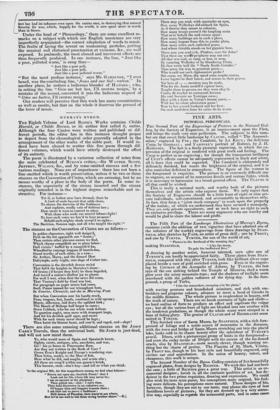MURRAY'S BYRON.
Tun Eighth Volume of Lord Byron's Works contains Childe Harold, or Childe Burun, as its author first called it, entire. Although the four Cantos were written and published at dif- ferent periods, the editor has in this instance thought proper to depart from the chronological order generally adopted in the arrangement of the other works of the noble poet. It would in- deed have been absurd to scatter this fine poem through dif- ferent volumes, which would have utterly destroyed the effect of its entirety.
The poem is illustrated by a variorum collection of notes from the more celebrated of BYRON'S critics,—Sir WALTER Score, JEFFREY, WILSON, &c., and by some omitted stanzas and a few various readings. None are of importance : there has not been a line omitted which is worth preservation, unless it be two or three stanzas on the Convention of Cintra, which are amusing, but by no means worthy of a place in the body of the poem. In some in- stances, the superiority of the stanza inserted and the stanza originally intended is in the highest degree remarkable and in- structive. For instance—
Yet if, as holiest men have deemed, there be A land of souls beyond that sable shore, To shame the doctrine of the Sadducee And sophists, madly vain of dubious lore ; How sweet it were in concert to adore
With those who made our mortal labours !
To bear each voice we fear'd to hear no more f
Behold each mighty shade reveal'd to sight— The Bactrian, Samian sage, and all who taught the right !"
The stanzas on the Convention of Cintra are as follows—
In golden characters, right well design'd, First on the list appeareth one "Junot ;" Then certain other glorious names we find, Which rhyme compelleth me to place below Dull victors ! baffled by a vanquish'd foe, Wheedled by conynge tongues of laurels due, Stand worthy of each other, in a row— Sir Arthur, Harry, and the dizzard Hew Dalrymple, seely wight, sore dupe of t'other tew.
Convention is the dwarfish demon styled That foil'd the knights in Marialva's dome Of brains (if brains they had) he them beguiled, And turn'd a nation's shallow joy to gloom. For well I nrot, when first the news did come, That Vimiera's field by Gaul was lost, For paragraph no paper scarce had room, Such Preens teemed for our triumphant host, In Courier, Chronicle, and eke in Morning Post.
But when Convention sent his handy-work, Pens, tongues, feet, hands, combined in wild uproar; • Mayor, alderman, laid down the uplifted fork ; The Bench of Bishops half forgot to snore; Stern Cobbett, who for one whole week forbore To question aught, once more with transport leapt, And bit his devilish quill ages, and swore With foe such treaty never should be kept ; Then burst the blatant beast, and roar'd, and raged, and—slept !
There are also some amusing additional stanzas on Sir JOHN CARR'S Travels, then the universal butt. Sir Jortx is just dead, and will not now mind them.
Ye' who would more of Spain and Spaniards know,
Sights, saints, antiques, arts, anecdotes, and war, Go! hie ye hence to Paternoster Row. Are they not written in the Book of Carr ?
Green Erin's Knight and Europe's wandering star. Then listen, reader, to the Man of Ink, Hear what he did, and sought, and wrote afar; All these are coop'd within one quarto's brink, This borrow, steal—don't buy—and tell us what you think.
-In the original MS., for this magnificent stanza, we find what follows— 'Frown not upon me, churlish Priest! that I Look not for life, where life may never be; I am no sneerer at thy phantasy;
• Thou pitiest me.—alas! I envy thee, Thou bold discoverer in an unknown sea. Of happy isles and happier tenants there; I ask thee not to prove a Sadducee ; Still dream of Paradisa, thou knowlit not where.
But lov'st too well to bid thine erring brother share."—E.3
There may you read, with spectacles on eyes, - How many 'Wellesleys did embark for Spain, As if therein they nieant to colonize, How many troops ycross'd the laughing main That ne'er beheld the said return again: How many buildings are in such a place, How many leagues from this to yonder plain, How many relics each cathedral grace, And where Giralda stands on her gigantic base.
There may you read.(oh, Phoebus, save Sir John
That these my worthrprophetic may not err) All that was said, or sung, or lost, or won, By vaunting Wellesley or by blundering. Frere, He that wrote half the "Needy Knife-Grinder."
Thus poesy the way to grandeur paves—
Who would not such diplomatists prefer? But cease, my Muse, ..thy speed some respite craves, Leave legates to their house, and armies to their graves.
Yet here of — — mention may be made, Who for the Junta modell'd sapient laws, Taught them to govern ere they were obey'd: Certes, fit teacher to command, because !Bs soul Socratic no Xantippe awes ; Blest with a dame in Virtue's bosom nurst,-- With her let silent admiration pause ! True to her second husband and her first; On such unshaken fame let satire do its worst.



























 Previous page
Previous page